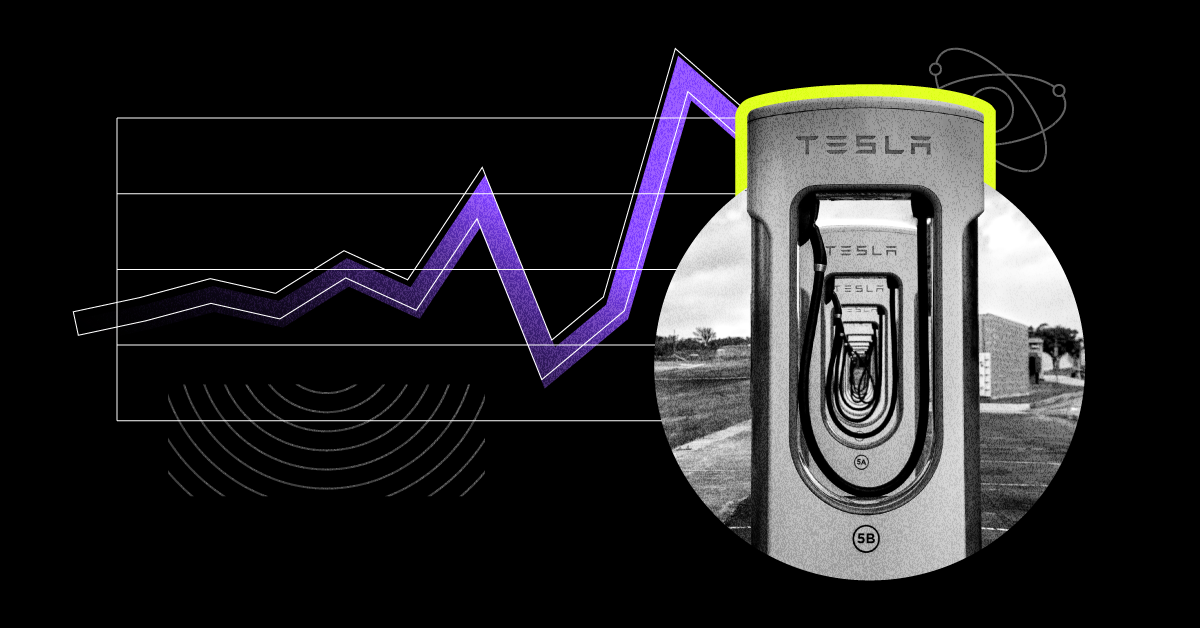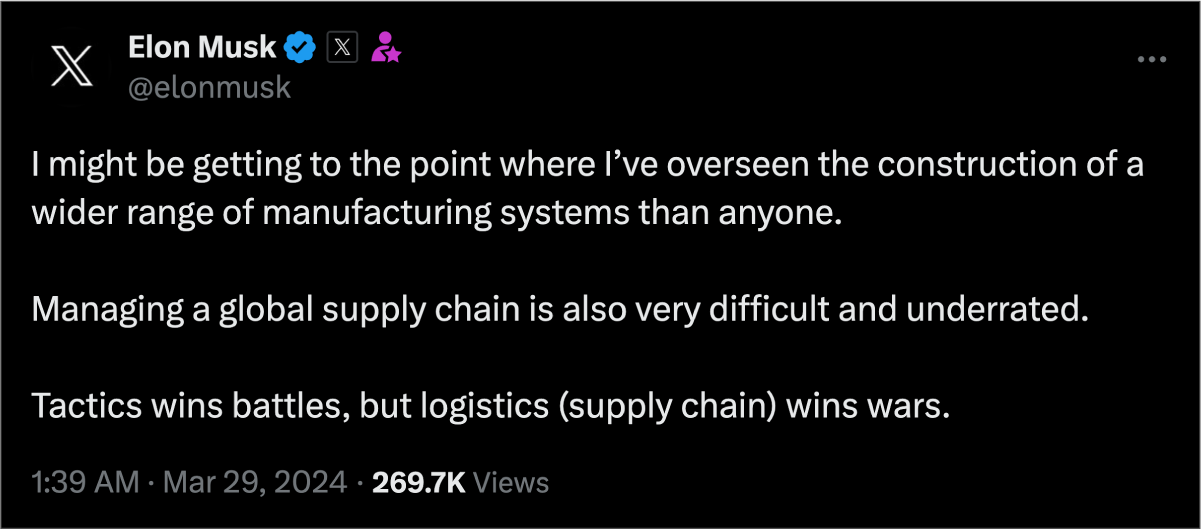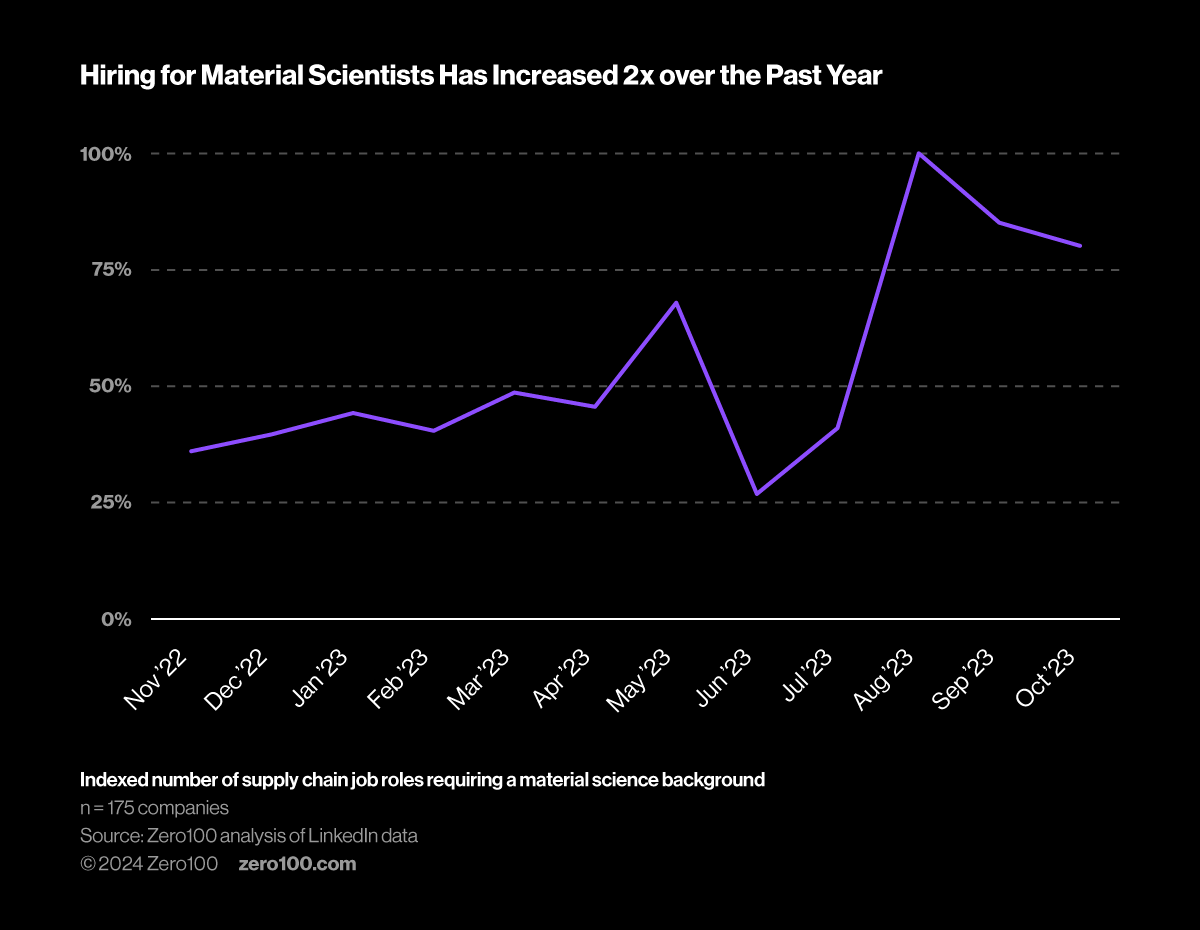
Three Lessons in Supply Chain Strategy from Elon Musk
Love or hate Elon Musk, he shows a sophisticated understanding of how supply chain strategy is a key enabler to business. Here are three ways he approaches supply chain which, if adopted, could create an advantage for leaders willing to stretch.
Elon Musk is now the largest private-sector employer in Austin, Texas. His Tesla factory there nearly doubled its employee headcount to 22,777 in 2023. Meanwhile, Musk’s other ventures in Texas show a sophisticated understanding of how supply chain strategy is a key enabler to his business. Lithium refining, rocket launches, and brain implant designs are all part of an extraordinarily ambitious push to reinvent things.
Musk’s experience scaling these ideas has taught him how important supply chain is to solving really big problems. His recent post on X is a compliment to supply chain leaders everywhere:

Here are three ways Musk approaches supply chain strategy, which, if adopted, could create an advantage for leaders willing to stretch.
Vertical Integration Makes Sense Now
Musk understands the value of directly controlling key assets that allow the operation to flex and grow over time. The EV business is one that Tesla pioneered over 20 years, scaling a unique collection of materials, components, and technical know-how from niche player to market maker. This includes new raw materials, a new battery supply chain, re-engineered robotics-heavy assembly operations, and a retail network of 5,600 charging stations, plus a cloud-based software ecosystem.
It’s working. Tesla has delivered over five million vehicles since 2016 at a 57% CAGR, transforming the global auto industry from GM to BYD in the process. Tesla has also demonstrated how vertical integration can make a difference when the path of innovation demands control over essential upstream inputs and downstream channels.
Musk isn’t the first to see this. Henry Ford developed rubber plantations in Brazil and built ore docks, steel furnaces, coke ovens, rolling mills, glass furnaces, and plate-glass rollers in his River Rouge mega-plant, launching the original mass-production auto industry.
Steve Jobs (via the supply chain genius of Tim Cook) saw the same. Apple’s investments in robotics, AI, microelectronic engineering, software design, and physical retail comprise the most vertically integrated supply chain of our time. Apple’s market cap of $2.6T has increased 768-fold since Tim Cook joined back in 1998.
Material Science Is a Supply Chain Unlock
Back in Texas again, Musk showcases another emerging idea in supply chain strategy: drilling into the molecular structure of materials to find better ways to convert and use them. His lithium plant near Corpus Christi is using new processing methods that are expected to be more environmentally safe and faster than most current plants.
In its natural state, lithium is widely available, but converting it into a metal that is usable in batteries is expensive. Cracking this problem at the engineering level could, if mixed with patient capital, provide enough affordable lithium to sustain the EV market for years. Musk likes to take a “first principles” approach that starts with the laws of physics and seeks breakthrough answers.
Historical parallels again help make the point. Thomas Edison experimented with over 2,000 different materials, looking for a filament that would glow brightly as electricity passed through it but not burn out in minutes. The final solution remains the meme for a brilliant idea, but, in reality, it was just dogged experimentation in material science.
Musk is not alone in focusing on materials science as an unlock to supply chain innovation. Zero100 data shows that hiring materials scientists into supply chain roles has doubled in the past year, led by apparel companies looking for sustainable fabrics and CPG companies looking for packaging alternatives.

(Almost) Nothing Is Impossible
Elon Musk brings another edge to supply chain strategy – thinking big. Seemingly impossible things like reusable space rockets, viable household power storage systems, and brain-controlled computers are the stuff of science fiction, yet all are real now.
Again, Musk’s approach echoes that of another innovator, Jeff Bezos, who created and scaled the Press Release/Frequently Asked Questions (PRFAQ) process to reinvent retail at Amazon. Offering customers unlimited, reliable, next-day delivery on e-commerce orders for a reasonable one-time annual fee sounded impossible, and yet Prime happened.
The key is refusing to be constrained by precedent when facing obstacles on the way to audacious goals.
Love Him or Hate Him…
Elon Musk is outrageous and not always likable, but his supply chain exploits offer lessons to ambitious leaders everywhere.